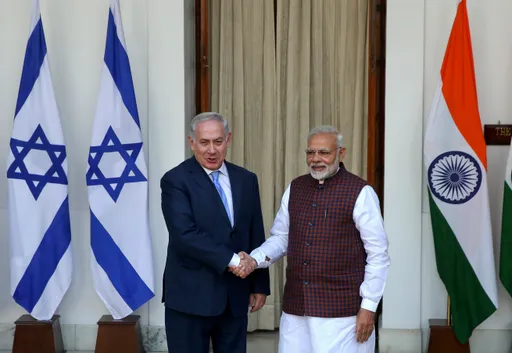Lebanon has approved a US-brokered maritime border deal with Israel, President Michel Aoun announced, unlocking significant offshore gas production for the eastern Mediterranean neighbours.
"I announce the approval by Lebanon of the final version prepared by the American mediator to delineate the southern maritime border," the Lebanese president said in a televised speech on Thursday.
Aoun described the deal as a "historic achievement", adding Lebanon was "able to recover a disputed area of 860 square kilometres".
"Lebanon did not concede a single square kilometre to Israel," he said, adding that his country had seized full control over the Qana field, despite parts of it falling within Israel's territorial claims.
"This indirect agreement responds to the Lebanese claims and fully preserves our rights," Aoun said.
He stressed that "no normalisation with Israel took place".
The agreement between the countries that have remained technically at war since Israel's creation in 1948 was earlier applauded by world leaders, including US President Joe Biden.
In an interview with a Lebanese TV station, US envoy Amos Hochstein on Thursday hailed the deal as "an agreement that could be credited for preventing chaos and further conflict throughout the region.
READ MORE:Israel, Lebanon 'reach' maritime border deal: Israeli PM
Hezbollah's approval
The deal will go into effect when the US sends "a notice containing confirmation of the agreement of both parties to the provisions of the agreement", according to the text of the agreement viewed by the AFP news agency.
It comes after Israeli Prime Minister Yair Lapid on Wednesday said the agreement would make conflict with Lebanon's Hezbollah less likely.
Responding to criticism from rivals back home, Lapid had on Wednesday rejected charges that he had agreed to a deal that could see fresh energy revenues reach Hezbollah.
"If we went out to battle, we would deal them a heavy blow. That being said, if it is possible to prevent war, it is the job of a responsible government to do so," he said.
The deal had faced hurdles, with a major source of friction being the Karish gas field, which Israel insisted fell entirely within its waters and was not a subject of negotiation.
Lebanon reportedly claimed part of the field and Hezbollah, which holds huge sway in Lebanon, threatened attacks if Israel began production at Karish.
But Hezbollah said on Tuesday it would back the agreement if the Lebanese government officially endorsed it.
READ MORE:Lebanon receives US proposal on maritime border dispute with Israel























